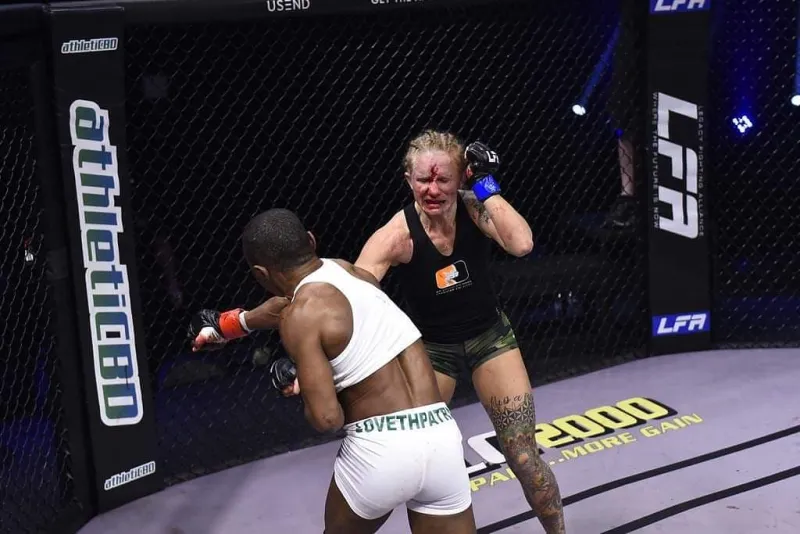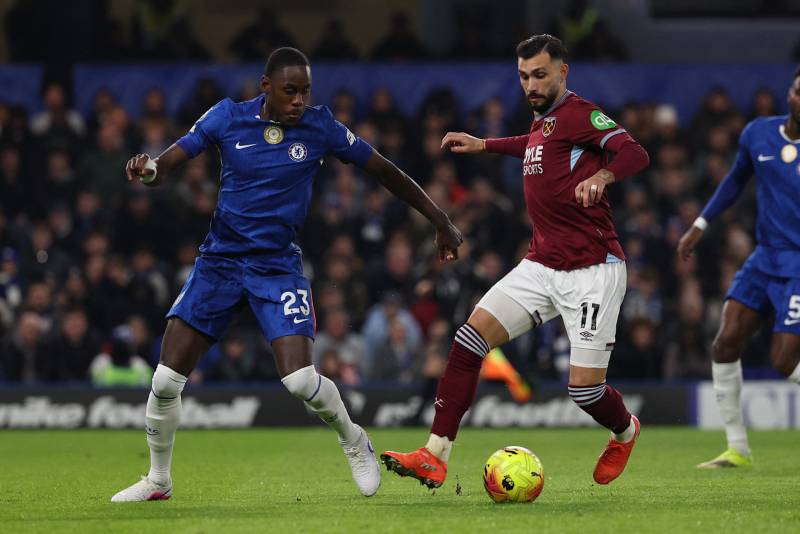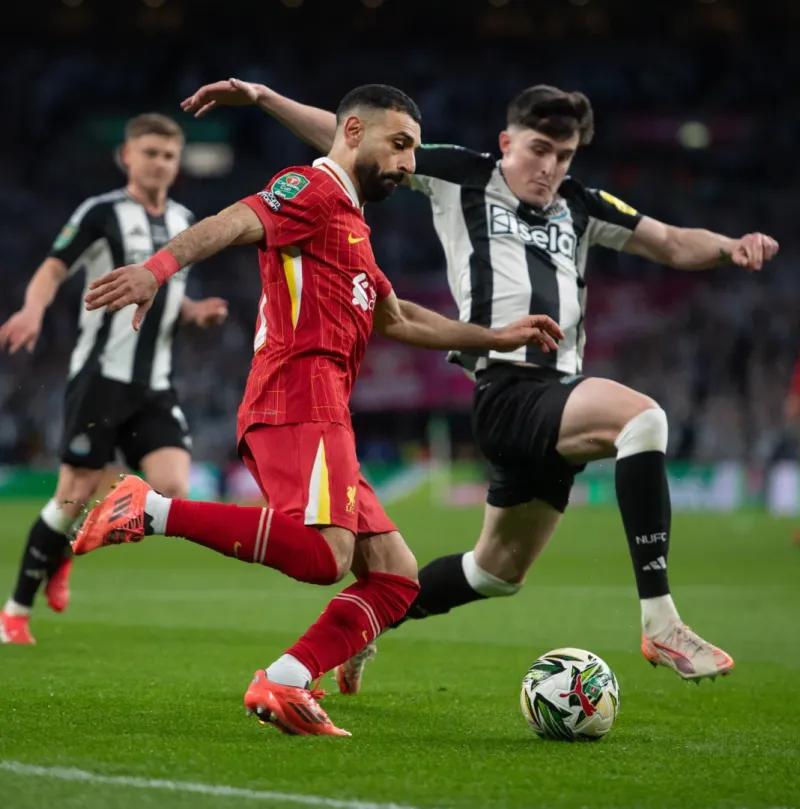A new season of English soccer—sorry, football—starts this weekend. Here’s everything an American needs to know about the sport, including which team to support.
Iam going to watch the English Premier League this year. Become a fan of a team. A supporter, as the Brits say. I’ve enlisted my wife in the effort. That was easy. She’s a former college soccer star and one-time high-school coach, and woke up at 4am this summer to watch the U.S. women’s team play. Our two kids will join in. It’ll be a family thing.
The hard part, I think, is figuring out what the hell is going on with the Premier League and, most importantly, which team to root for. I am from Chicago, so I was born into Cubs, Bears, Bulls, and Blackhawks fandom. If I was to switch my team allegiance in one of the four major American team sports, I would carry the baggage of geography and tradition. I come to the Premier League fresh—a blank slate.
I am not alone in this pursuit. In July 2019, 14 million Americans watched the U.S. women's team beat The Netherlands in the World Cup final. This summer, more than six million Americans tuned in for the European Cup final. By comparison, the 2021 NBA Finals averaged roughly nine million viewers.
To wrap my head around the English Premier League—including how to choose a team to support—I interviewed Esquire Politics Editor Jack Holmes, who is one of two soccer obsessives on staff. Our conversation has been edited and condensed. – Michael Sebastian
Why are you, an American, qualified to tell me about the English Premier League?
Like many American soccer fans, I got into the European professional game following a World Cup—in my case, 2006. Ever since I've been a pretty loyal Premier League viewer.
What is the English Premier League? And remember, I am a complete novice here.
Every European country has its own league, but the major leagues are in England, Spain, Italy, Germany, and to a lesser extent, France. The English league, the Premier League, has risen to the top. It consists of the 20 best teams across England and Wales, who can earn the right to compete in this league through a promotion and relegation system, which we'll get to.
Does the Premier League include Scotland or Ireland?
No. Scotland has its own league, and Ireland has its own league, which is not one of the best. The best Irish players will come over to the Premier League in England. And that's the way things usually shake out: if you are one of the best Irish players, one of the best Egyptian players, one of the best French players, there's a very good chance you play in the Premier League.
When do Premier League teams play?
At the beginning of the season, they play once a week, on Saturday or Sunday. Not to complicate things—
Uh-oh.
But as we get deeper into the season, there are cup competitions, like the FA Cup, which is the oldest knockout competition of any sport in the world. Some weekends are FA Cup weekends and the Premier League is paused. They resume the Premier League the next week. Deeper in the season, there are midweek games because the schedule gets so congested. Ultimately, the top teams end up playing in a number of competitions because they keep winning.
But the basic rule of thumb is that you play once a week on Saturday or Sunday?
Yes.
How do I watch these games?
NBC Sports and the Peacock app.
What time do the games usually start?
There are four time slots on Saturdays. There's one at 7:30am, a few at 10am, another one at 12:30pm, and one at 3:00pm. The times are a little different on Sunday.
For a parent of young kids, 7:30 on a Saturday morning is an ideal time.
That's a big part of the American fan base, one which NBC highlights: it is a family experience, especially for people with young kids, because they're up early anyway.
It becomes a weekend tradition.
For me, it's a great way to start the weekend. I wake up Saturday morning and put on a game with my coffee. I might be watching on and off. I might be really focused on it. But it's a companion as you start your weekend.
How do you feel about drinking during the morning games?
I usually wait until at least the 12:30 game.
How long does the season last?
It's 38 games, August through May.
Do they have a playoff at the end?
They don't have playoffs in the Premier League. You get three points for a win, one for a draw, none for the loss. At the end of the season, it's just the league table, which is the equivalent of standings at the end of the regular season.
So they don't have a championship game?
No. It's just your excellence over the course of the regular season. The cup competitions, which are separate, are usually knock-out competitions in the vein of an NCAA tournament, in the vein of the NFL playoffs, which is: you lose, you go home.
There is something deliciously American about being a wild card team that can get into a playoff and have the same opportunity as the best team in the league. In other words, as long as you're good enough to enter the playoffs, anything can happen. It's sad to me that the Premier League doesn't have that sort of thing.
There are many ways in which we tend to think of Europe as more interested in egalitarianism and leveling the playing field in terms of economics, but it's actually very much the opposite in European soccer in that it's a purely capitalist enterprise where the big teams have more money, so they have more money to spend on players. There is no salary cap. The financial power of the big clubs becomes a self-perpetuating prophecy in a way that it just doesn't happen with, say, the New York Yankees, despite their financial power in U.S. sports. You can book it that Manchester City will be one of the top three teams next season, just because they have the financial power. They have two teams' worth of top players, whereas the small teams, they can't operate that way, and there's no draft for them to pick first and get the best player.
Are there any exceptions?
The cup competitions are the exception. A tiny team from somewhere in the Midlands of England can earn a trip to play Manchester United at Old Trafford. They could win and go to the next round and have a fairytale story. But in the league, it's very much a pitched battle. It's a war over 38 games where having a large army that is highly capable and organized is usually what ends up leading to victory.
Have there been Cinderella stories in the regular Premier League?
Leicester City, which is not traditionally one of the biggest clubs in England, did win the Premier League in 2016, which was a shock. Over the last five years, it's been Manchester City and Liverpool winning the Premier League.
leicester city
Leicester City players lift the Premier League trophy in May 2016. They are a recent Cinderella story from the Premier League.
Let's talk about relegation right now. Explain what this is.
There's a dog-eat-dog element to this, beyond just the financial, in that you have to earn a place in the Premier League. The three worst teams in the league every season are thrown out of the Premier League, and they have to go down into the Championship where there's much less TV money, it's much harder to recruit top players, it's very hard to get back into the Premier League. And then they're replaced by the three top teams in the Championship every season.
What’s the benefit of doing it this way?
This fosters a level of necessary competition at both ends of the table. There's no Cleveland Browns going 15 years and wallowing in mediocrity, because they would be two or three levels down in the English tier system of leagues, which has happened to clubs. There's a team called Sunderland, and there's actually a great Netflix series about them called Sunderland ‘Til I Die, which I would recommend. It intertwines how the decay of Sunderland as a former shipbuilding community—that is, the hollowing out of this post-industrial city—is tied to the decline of the soccer club, which has a 50,000 seat stadium, and is now in the third division, called League One (which is a perplexing name). They're basically in the wilderness. They are struggling to even get out of that league and they're nowhere close to getting back to the Premier League.
a general view of the stadium of light
Sunderland’s Stadium of Light, as its known, in 1997.
STU FORSTERGETTY IMAGES
Brutal.
That's what happens if you mismanage your club financially, if you have a couple bad seasons. There are consequences. I'm a New York Knicks fan. There are many seasons in which we probably should have been relegated from the NBA, if only to change the behavior of ownership or at the executive level.
sunderland fans
Sunderland fans react to a missed shot in a game from this year.
STU FORSTERGETTY IMAGES
ADVERTISEMENT - CONTINUE READING BELOW
Which team do you support?
Arsenal.
How did you become an Arsenal fan?
I started following the League pretty intensely in 2006. It didn't feel fair for me to become a Manchester United fan. It just felt like—I was already a Yankee fan. It felt like the easiest road possible. At that time, Arsenal were coming off a golden era in their history. The other team that was starting to rise at that time was Chelsea, but they were fueled by, basically, the money of a Russian oligarch, Roman Abramovich, who took a middling London club, despite its location in a very posh area, and turned them overnight into a contender. For me, Arsenal just seemed like a club with a rich tradition. They're one of the oldest clubs in England, and they had this revolutionary manager named Herbert Chapman in the 1920s and '30s, who introduced jersey numbers in soccer. I was always going to pick a London team because that's one of my favorite cities in the world.
arsenal cup team
The Arsenal team in 1927. Their legendary manager, Herbert Chapman, is seated in the bottom right.
KIRBYGETTY IMAGES
There are a cluster of London teams, right?
Yes. You have Arsenal, Chelsea, Tottenham Hotspur, West Ham, Crystal Palace, Watford are in greater London, and the newcomers to the League, Brentford, who are in west London.
So which team in the Premier League should I support?
If you're looking for a top team that's competing to win the title, I would recommend Liverpool.
Why Liverpool? Because they're good?
They're good, but they don't have some of the same baggage as some of the other top teams.
What do you mean?
I interviewed Roger Bennet, co-host of the soccer podcast Men in Blazers and show of the same name on NBC Sports, before the 2019-20 season. He talks about this concept of nation-washing, or football-washing, in which Manchester City was bought by the royal family of Abu Dhabi, basically as a cultural olive branch to the western world in which they tried to remake their image as a patron of the art of soccer. And they have spent hundreds of millions of pounds towards that aim and have created a very good product on the field. But there's some baggage that comes with that, and there's some baggage that comes with supporting Chelsea, which is owned by one of Vladimir Putin's right-hand men.
I don't want to root for any friend of Vladimir Putin.
If you're looking for one of the very top teams, I would never recommend Arsenal, as much as I love them. Liverpool plays in their original stadium, Anfield. They have amazing traditions in the stadium where they sing the song, “You'll Never Walk Alone,” which is originally a Rogers and Hammerstein musical ballad that was sung by Elvis Presley at one point. It speaks to the heritage of Liverpool fandom where they call themselves Scousers, and they've always considered themselves separate from the rest of England. They're a port town in the Northwest.
If you're looking for a top team that's competing to win the title, I would recommend Liverpool.
They also have a kinship with America. Liverpudlian sailors would go over to the U.S. and bring back American records that ended up having a huge influence on English music and culture. And they're owned by an American guy, John Henry, who owns the Boston Red Sox.
They have an incredible team, and a great manager named Jürgen Klopp, who's this effervescent German guy. He has unlimited enthusiasm, gives very honest interviews, and has pioneered this style of soccer that he calls heavy-metal football, where it's high pressing, high intensity, high energy. They have these two players in particular, Mohamed Salah—who was the best player in the Premier League a few seasons in a row—and Sadio Mane.
Jürgen Klopp has dad jokes in his locker.
It's a fun team to watch; it's a fun culture around it; and you're going to be competing for the top prizes.
What about Leeds? At least one person has suggested I support them.
Well, Leeds is certainly the hipster pick, and they're also an example of the volatility of the English game. They were one of the best teams in England around the turn of the millennium. Then crashed due to catastrophic financial mismanagement. They were relegated twice, and have rebuilt themselves and come back in this new form under a very idiosyncratic manager named Marcelo Bielsa. He is always drinking a cup of tea on the sidelines, and he's squatting like a baseball catcher, drinking his tea, while his team executes his plan to a T. He has a very particular style. Last season, the team was collectively running 115 kilometers a match. They are one of the hardest working teams in the league. But they also play some really dynamic soccer.
Why are they a hipster pick?
Most people would say, pick one of the top teams and go. Leeds are not going to win the league, and they're probably not going to get too close to even qualifying for the Champion's League, which comes with the top four places. But they're a ton of fun, and it's the no-guilt proposition. You just get to enjoy it. I no longer feel bad about being an Arsenal fan, because it's just been a succession of depressing episodes. But at the time I took one of the easy ways out by adopting them as my team.
Am I going to feel that way if now, all of a sudden, I'm a Liverpool fan?
I don't think you should. Roger Bennett has also said what he likes about American Premier League fandom is that it's a journey of discovery, and it's a pure experience. If you grow up over there, for the most part, your dad was a fan of Newcastle, you're a fan of Newcastle, you hate Sunderland, and you're not too happy about what's going on with your club. But I think, no matter who you choose, it's hard to go wrong in that there's just so much to discover about the league, the style, the club, the fan base, the culture that surrounds it, the city that has birthed this whole culture and sustained it for so long.
You can have a couple horses. I kind of also support Crystal Palace. They're my second horse.
Tell me about Crystal Palace. Great name.
Yeah, Crystal Palace is an interesting one. They’re from South London, which is a vision of the new Britain.
What do you mean by “new Britain”?
I've gone to a Crystal Palace game, and it's in this ancient stadium from the 1920s. It's built right into this London suburb of Croydon in South London. And the stands are just a menagerie of people of all different backgrounds who all come together every weekend to support this one team. And you get that a bit in Arsenal and Tottenham, in North London, but it feels especially potent with Crystal Palace. And they're just a smaller club, so they're maybe a little more likable.
So you’re suggesting Liverpool and maybe Crystal Palace.
I would pick a couple horses to follow: Liverpool, Crystal Palace. Leicester are a lot of fun.
Why Leicester?
They won in 2016, and they're so well run that they have sustained that success, where now they are competing for the top four places every season. They do it on a Moneyball budget compared to other clubs. They are very savvy in identifying players before they've blown up. They get them pretty cheaply and then they sell them to bigger clubs for big money, and then they reinvest that money and sustain themselves that way.
What about Aston Villa? I’ve also heard of them.
They are a great choice. Unfortunately, they just sold their talismanic playmaker, Jack Grealish, who's going to Manchester City, which is a sign of how things work—eventually the big fish will come and take your best players. But there are still a lot of really good young players there, and they're from Birmingham, which is also a very diverse and interesting place now. If you watch Peaky Blinders, you'll be familiar with Birmingham. They have a rich history, and Prince William is an Aston Villa supporter.
aston villa prince william
Prince William talks to his son, George, during an Aston-Villa game in 2019.
STEPHEN PONDGETTY IMAGES
Are there any teams that have very famous fans or supporters?
Manchester City have the Gallagher brothers from Oasis. They're very vocal supporters.
Is there a pro-Brexit, pro-Boris Johnson team I should look to avoid?
People say that Burnley play Brexit football, but that's more of a stylistic thing. It doesn't really map that way with the players because of their international diversity. The Premier League had a big reaction to the George Floyd protests, in which every team took a knee through all of last season, including Burnley, but a small fan group flew a plane with a banner reading, “All White Lives Matter,” over their home ground at the start of the game. Burnley’s captain, Ben Mee, a white guy, spoke very eloquently after the game about how that was unacceptable. But there are certain fanbases you should take into account. Chelsea, historically, has big issues with racism in the fanbase. They might dispute that they have a particular problem now compared to other clubs, but that's what they're associated with. There's a record of it.
Do any teams have mascots?
Some of them do, but it's much more tied to nicknames and even more so the traditions around fandom. Everything emerges organically, where the fans are constantly coming up with their own songs to sing about certain players, about the opposition, about the referee. The backbone of the cultural product is the atmosphere in the stadium, and every stadium is different, in terms of what you get. Arsenal are known for not having the most lively fan base; the stadium is not crackling. Crystal Palace had an amazing atmosphere when I was there.
If I really embrace this—I start wearing a Liverpool shirt; I tell people, "I've got to get up Saturday morning to watch my club”; maybe I start going to English soccer bars for some of the bigger matches—what am I communicating about myself? Is there a stigma to it?
JH: It's pretty much dissipated. People have embraced this idea that you can just choose arbitrarily, and if you support them long enough, it becomes part of you, and legit. The Premier League is shown in 200 countries, and there is some resentment about that locally, and around the internationalization of the game, and whether something's lost in the club culture. But the argument is settled, I think, that anybody can be a Liverpool fan. You don't have to be from Liverpool. You've just got to know what you're talking about.
SOURCE : Esquire




